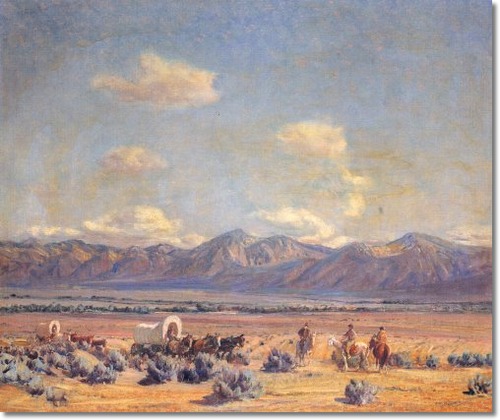With the buffalo being driven to extinction
by white hunters, the Cheyenne and Arapaho pushed back. Half
a dozen violent encounters took place between Indians and settlers
on the Oregon Trail. The federal government was not honoring
its obligations under the Fort Laramie treaty, and something had to
be done about protecting the buffalo or the Indians would soon
perish.
click here for more on the war with the
Cheyenne
Jefferson Davis' last official act as
secretary of war was to direct a campaign against the Cheyenne in
order to punish them for hostilities against whites settlers
. The Cheyenne must be '"severely punished," said Davis, "and
no trifling or partial punishment will suffice."

Settlers unlawfully encroaching on Cheyenne lands
provoked open conflcts on the high plains that ultimately led to
open warfare. The federal government found itself in the untenable
position of protecting white settlers guilty of violating treaties
and while going to war against those who had upheld American
laws. "We do not understand you white people," said the great
Crow chief, Plenty-Coups. "You break your laws and you
violate your religion. You fool no one but yourselves."
By right of the
treaty at Horse Creek, the Cheyenne and Arapaho held title to the
land between the North Platte and the Arkansas rivers. In
1854, the eastern boundary of their territory had crumbled under
the weight of settlers in the Kansas Territory, and the federal
government did nothing to protect their resources. The
migration routes of the buffalo - across the central plains of
Kansas and Nebraska - was now broken in two by emigrant trails
which the buffalo would not cross. Their winter camping
grounds on the eastern slope of the Rockies had been taken over by
gold diggers. By 1859, more than 100,000
'fifty-niner's' were camped in the Pike's Peak country.
At the
conclusion of the Horse Creek Treaty, treaty commissioner Thomas
Fitzpatrick predicted that the freedom of the Plains Indian would
be vanquished by the white man in one more lifetime. His
prediction, only five years old, was already coming to pass.
Western
historian S.J. Killoren wrote : "It was one of the most flagrant
and serious violations of the guarantees made to the Plains tribes
by the Fort Laramie treaty. The invasion of Indian country by
settlers was specifically prohibited by the Kansas/Nebraska Act of
1854. Also, where were the white troops to protect Indian
rights? And while this was a depredation far more excessive
than any Indian attack on an emigrant wagon train, it occasioned no
government condemnation. The War department fielded no
expeditionary force to punish and remove the invaders and thus
maintain the promised peaceful coexistence. The Indian
office, with direct responsibility, never filed a single complaint
with the Department of War, or petitioned Congress to enforce
treaty obligations. William Bent noted in 1859 that gold
miners had quickly taken over choice Indian country and brought
"many causes of irritation" to the land's owners. Now they
were being pressed into a small territory that was beset by the
constant parade of emigrants from Texas, Kansas, and the Platte,
and bisected into even smaller segments by criss-crossing
roads."
Bent
foreshadowed things to come in his annual report to Washington: "A
smothered passion for revenge agitates these Indians, perpetually
fomented by the failure of food, the encircling encroachments of
the white population, and the exasperating sense of decay and
impending extinction with which they are surrounded."
Related People
Related Events
Related Flashpoints
Related Places